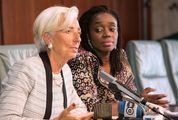Virtual reality gives tourists a visual sample
by Kadhim Shubber,
2016-01-05 06:23:43.0
IN THE past, virtual reality in the tourism industry has typically meant websites where users can click to explore the inside of a building. Now, more advanced headset technology from the likes of Facebook, Google, Sony and Samsung will allow customers to try before they decide to pay.
Booking holidays has always been a gamble. Prospective travellers scan websites, read dozens of reviews and meticulously research a destination before making a decision and paying their money.
But consumers never know just what they have got into until they unpack their bags and realise the hotel they booked is not quite as the pictures suggested.
Now hotel chains, tour operators and tourism boards are using virtual reality to let customers experience products and destinations before they part with cash, deploying headsets to give them a taste of helicopter rides above New York and pristine Pacific beaches, in an attempt to boost sales and raise customer satisfaction.
Last year, hotel operator Marriott International unveiled the Teleporter, a phone-box like structure that users stand in while wearing an Oculus Rift headset to be virtually transported to a black sand beach in Hawaii or the top of the Tower 42 skyscraper in London.
Destination British Columbia, a tourism body, has created similar experiences that let people explore the rivers and forests of Canada’s western province.
Travel agency Thomas Cook has rolled out Samsung Gear headsets at a handful of stores in the UK, Germany and Belgium. The technology may encourage customers to visit its shops, which have suffered as holiday bookings have moved online.
Kathryn Darbandi, Thomas Cook’s UK director of retail and customer experience, says early feedback from stores suggests the headsets have "inspired some customers to book trips and excursions they may not have considered".
She says: "The technology seems to have really captured people’s imaginations by bringing to life holiday experiences in a way a brochure or a video can’t."
Henry Stuart is the founder of Visualise, a London-based production studio that made Thomas Cook’s virtual reality content. His company has worked on in-flight virtual reality experiences for Qantas and filmed sharks in SA with 360-degree cameras to make virtual reality content for the country’s tourism board.
He expects the technology will not be used at the point of purchase only, but also while consumers are on holiday in a bid to encourage them to go on excursions. "You can don a headset (in your hotel), do quad biking over some dunes, or go scuba diving and decide what you want to do," he says.
Virtual reality has developed in fits and starts. A rush of enthusiasm in the early 1990s died off as users found the screen resolution too low to produce a realistic, immersive experience.
The Oculus Rift, financed after a campaign on crowdfunding website Kickstarter, has fuelled a new wave of excitement about virtual reality.
Last year, Facebook paid $2bn for the company, which will release its first consumer product early this year.
"That was a catalyst moment," says Simon Gosling, the CE of Happy Finish, which produces virtual reality content for companies and advertisers.
The publicity around the deal and Facebook’s backing tipped the balance as consumer-facing companies began taking virtual reality more seriously, he says.
So far, travel groups have had to buy the hardware, as well as commission the content, in order to tap into the potential of virtual reality.
Gosling says moving beyond the current limited usage will require widespread access to the hardware, but also online streaming platforms to host the content.
"Gaming will be a key component of pushing the availability of virtual reality," he says, adding that moves by YouTube to add virtual reality functionality on its website and apps will also be crucial.
Dimitrios Buhalis of Bournemouth University’s eTourism Research Lab says virtual reality will "whet the appetite" for travel rather than encourage would-be tourists to stay at home.
Buhalis says: "It’s not going to replace travel. It will enable people to have more realistic expectations and to choose better."
© Financial Times 2015
Tourism boards are using virtual reality to give prospective travellers a taste of what a destination offers, with South African Tourism commissioning content that captures shark activity. Picture: REUTERS
IN THE past, virtual reality in the tourism industry has typically meant websites where users can click to explore the inside of a building. Now, more advanced headset technology from the likes of Facebook, Google, Sony and Samsung will allow customers to try before they decide to pay.
Booking holidays has always been a gamble. Prospective travellers scan websites, read dozens of reviews and meticulously research a destination before making a decision and paying their money.
But consumers never know just what they have got into until they unpack their bags and realise the hotel they booked is not quite as the pictures suggested.
Now hotel chains, tour operators and tourism boards are using virtual reality to let customers experience products and destinations before they part with cash, deploying headsets to give them a taste of helicopter rides above New York and pristine Pacific beaches, in an attempt to boost sales and raise customer satisfaction.
Last year, hotel operator Marriott International unveiled the Teleporter, a phone-box like structure that users stand in while wearing an Oculus Rift headset to be virtually transported to a black sand beach in Hawaii or the top of the Tower 42 skyscraper in London.
Destination British Columbia, a tourism body, has created similar experiences that let people explore the rivers and forests of Canada’s western province.
Travel agency Thomas Cook has rolled out Samsung Gear headsets at a handful of stores in the UK, Germany and Belgium. The technology may encourage customers to visit its shops, which have suffered as holiday bookings have moved online.
Kathryn Darbandi, Thomas Cook’s UK director of retail and customer experience, says early feedback from stores suggests the headsets have "inspired some customers to book trips and excursions they may not have considered".
She says: "The technology seems to have really captured people’s imaginations by bringing to life holiday experiences in a way a brochure or a video can’t."
Henry Stuart is the founder of Visualise, a London-based production studio that made Thomas Cook’s virtual reality content. His company has worked on in-flight virtual reality experiences for Qantas and filmed sharks in SA with 360-degree cameras to make virtual reality content for the country’s tourism board.
He expects the technology will not be used at the point of purchase only, but also while consumers are on holiday in a bid to encourage them to go on excursions. "You can don a headset (in your hotel), do quad biking over some dunes, or go scuba diving and decide what you want to do," he says.
Virtual reality has developed in fits and starts. A rush of enthusiasm in the early 1990s died off as users found the screen resolution too low to produce a realistic, immersive experience.
The Oculus Rift, financed after a campaign on crowdfunding website Kickstarter, has fuelled a new wave of excitement about virtual reality.
Last year, Facebook paid $2bn for the company, which will release its first consumer product early this year.
"That was a catalyst moment," says Simon Gosling, the CE of Happy Finish, which produces virtual reality content for companies and advertisers.
The publicity around the deal and Facebook’s backing tipped the balance as consumer-facing companies began taking virtual reality more seriously, he says.
So far, travel groups have had to buy the hardware, as well as commission the content, in order to tap into the potential of virtual reality.
Gosling says moving beyond the current limited usage will require widespread access to the hardware, but also online streaming platforms to host the content.
"Gaming will be a key component of pushing the availability of virtual reality," he says, adding that moves by YouTube to add virtual reality functionality on its website and apps will also be crucial.
Dimitrios Buhalis of Bournemouth University’s eTourism Research Lab says virtual reality will "whet the appetite" for travel rather than encourage would-be tourists to stay at home.
Buhalis says: "It’s not going to replace travel. It will enable people to have more realistic expectations and to choose better."
© Financial Times 2015





















Change: 0.57%
Change: 0.48%
Change: 1.10%
Change: 0.25%
Change: 1.03%
Data supplied by Profile Data
Change: 0.00%
Change: 0.00%
Change: 0.57%
Change: 0.00%
Change: 0.00%
Data supplied by Profile Data
Change: 0.02%
Change: 0.03%
Change: 0.09%
Change: 0.31%
Change: -0.22%
Data supplied by Profile Data
Change: 0.00%
Change: 0.00%
Change: 0.00%
Change: 0.00%
Change: 0.00%
Data supplied by Profile Data